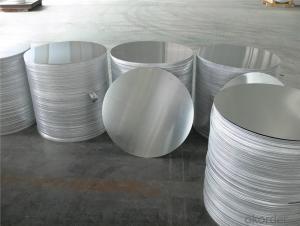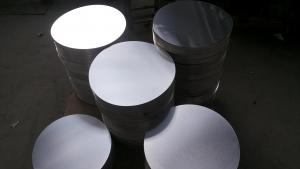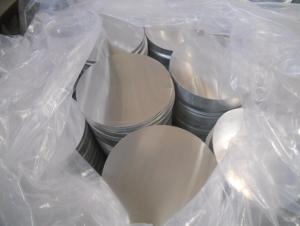Hot Rolled Aluminium Circle for Cooking Pot AA3003
- Loading Port:
- China Main Port
- Payment Terms:
- TT or LC
- Min Order Qty:
- -
- Supply Capability:
- -
OKorder Service Pledge
OKorder Financial Service
You Might Also Like
1.Structure of Product Description
Hot Rolled Aluminium Circle is one material for aluminium pot. This alloy for this circle is AA3003. Compared to continuous casting aluminium circles, the hot rolled aluminium circle can provide better mechanical quality. If you production method is deep pushing, we recommend that you use hot rolled aluminium circle.
2. Main features of the product
a.Competitive price---We have our own mills and can produce mill finished aluminium coils, so we can control the production cost better.
b.Professional after-sale service---We have more than 15 years exportation experience and you need not worry about the exporation problems.
c.Fast delivery time---We can control the delivery time within 35 days.
3. Image
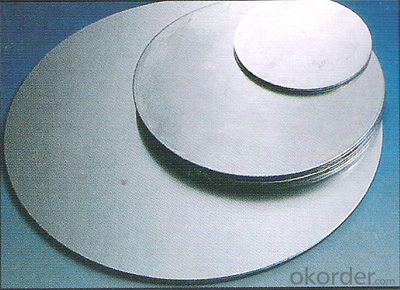
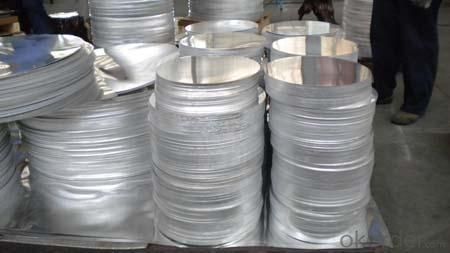
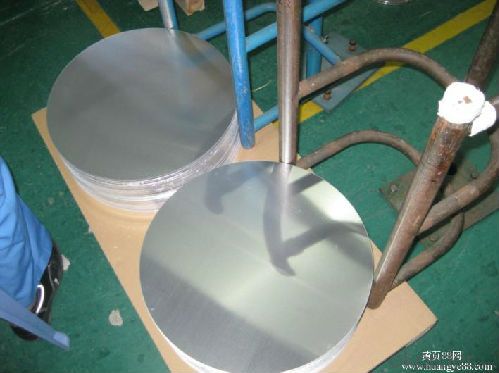
4. Product Specification
| Alloy | Temper | Production line | Thickness | MOQ |
| AA3003 | H14 | Hot Rolled | 0.2MM-3MM | 2 TONS for every size |
5.FAQ
What is the quality standard?
---Usually our standard is GB3880-2006
What is the largest width?
---It is 2300mm
What is the MOQ?
---Usually we can accept 2 tons.
- Q:How are aluminum coils processed for specific applications?
- Aluminum coils are processed for specific applications through a series of steps that include cleaning, rolling, annealing, and coating. First, the coils are cleaned to remove any impurities or contaminants. Then, they are passed through a rolling mill to reduce the thickness and increase the length. Annealing is done to improve the metal's mechanical properties by heating and then slowly cooling it. Finally, a coating may be applied to enhance the coils' corrosion resistance, appearance, or specific functionality, depending on the intended application.
- Q:Can aluminum coils be used in pharmaceutical manufacturing?
- Yes, aluminum coils can be used in pharmaceutical manufacturing. Aluminum is a commonly used material in the pharmaceutical industry due to its excellent properties such as corrosion resistance, light weight, and ability to maintain product integrity. Aluminum coils are often utilized for packaging purposes, such as in blister packs, due to their suitability for protecting the medicine from moisture, light, and external contaminants.
- Q:What is a common reaction of this element?What is another element closely related to Aluminum?Thank youuuuu.
- Al + Cl2 --- AlCl3 aluminum trichloride is an important substance used in several organic chemical reactions of indistrial importance. It is what is called a Lewis acid, something you will get to. Possibly gallium, just below it in the periodic table.
- Q:What are the different color options available for aluminum coils?
- The different color options available for aluminum coils include standard colors such as white, black, brown, and gray, as well as a wide range of custom colors that can be matched to specific preferences or architectural requirements.
- Q:Can aluminum coils be used in the production of heat exchangers?
- Yes, aluminum coils can be used in the production of heat exchangers. Aluminum is a popular choice for heat exchangers due to its excellent thermal conductivity, which allows for efficient heat transfer. Additionally, aluminum is lightweight and corrosion-resistant, making it a durable and long-lasting option for heat exchanger applications. The use of aluminum coils in heat exchangers is common in various industries, including HVAC, refrigeration, automotive, and aerospace.
- Q:Can aluminum coils be painted or coated with different colors?
- Aluminum coils have the capacity to be painted or coated with a variety of colors. Aluminum, being a versatile material, can be easily painted or coated to achieve the desired aesthetic appearance. The coil can undergo pre-painting or coating prior to being shaped, or it can be painted or coated after being shaped. There are different methods available to apply the paint or coating, such as spraying, rolling, or dipping. Moreover, there are numerous options for paint or coating, including powder coating, liquid paint, or anodizing, which can offer different colors, finishes, and levels of durability. In summary, painting or coating aluminum coils is a widespread practice that improves their appearance and safeguards them from corrosion or other environmental factors.
- Q:What are the typical applications of aluminum coils in the automotive industry?
- Aluminum coils are widely used in the automotive industry for various applications due to their advantageous properties. One typical application is in the manufacturing of automotive heat exchangers, such as radiators and condensers. The high thermal conductivity of aluminum allows for efficient heat transfer, enhancing the cooling efficiency of the vehicle's engine and air conditioning system. Another common use of aluminum coils in the automotive industry is for making lightweight body panels and structural components. Aluminum is known for its low density, which helps reduce the overall weight of the vehicle. This, in turn, improves fuel efficiency and reduces emissions. Additionally, aluminum's high strength-to-weight ratio makes it ideal for impact-absorbing structures, enhancing the safety of the vehicle. Aluminum coils are also utilized in the production of electrical wiring systems and connectors in automobiles. Aluminum's excellent electrical conductivity enables the efficient transmission of electrical signals throughout the vehicle. Furthermore, its corrosion resistance properties make it suitable for use in various weather conditions. Moreover, aluminum coils find application in the production of suspension systems, such as control arms and knuckles. The stiffness and durability of aluminum help enhance the vehicle's handling and responsiveness, resulting in improved driving dynamics. In summary, the typical applications of aluminum coils in the automotive industry include heat exchangers, lightweight body panels, electrical wiring systems, and suspension components. These applications capitalize on aluminum's advantageous properties, such as high thermal conductivity, low density, excellent electrical conductivity, and corrosion resistance.
- Q:Are aluminum coils resistant to UV radiation?
- Yes, aluminum coils are generally resistant to UV radiation. Aluminum is a highly durable and corrosion-resistant material, and it has natural properties that make it resistant to the damaging effects of UV radiation. Unlike certain other metals, aluminum does not oxidize or deteriorate when exposed to sunlight for extended periods of time. This makes it an ideal choice for applications where UV exposure is a concern, such as outdoor structures, solar panels, and automotive components. However, it is important to note that while aluminum is resistant to UV radiation, it can still be subject to other forms of degradation if not properly protected or maintained.
- Q:Can aluminum coils be used in the production of automotive heat shields?
- Automotive heat shields can indeed utilize aluminum coils. The reason behind aluminum's popularity as a heat shield material lies in its remarkable thermal conductivity and heat resistance characteristics. By utilizing aluminum coils, heat shields can be crafted to be both lightweight and durable, effectively diverting and reflecting heat away from crucial components within the automotive system. Furthermore, the flexibility of aluminum coils enables them to be easily molded and shaped, ensuring a perfect fit for any automotive application.
- Q:What is the difference between hot-rolled and cold-rolled aluminum coils?
- The manufacturing process and resulting properties of the finished product differentiate hot-rolled and cold-rolled aluminum coils. Hot-rolled coils are made by subjecting aluminum ingots to high temperatures and passing them through rollers to achieve the desired thickness and shape. This process enhances the aluminum's malleability and allows for greater flexibility in terms of size and shape. Hot-rolled coils are generally larger and have a rougher surface finish compared to cold-rolled coils. In contrast, cold-rolled coils are produced by cooling down the hot-rolled coils and passing them through rollers at room temperature. This not only reduces the thickness of the aluminum but also improves its surface finish, resulting in a smoother and more pleasing appearance. Cold-rolled coils are typically thinner and have a more consistent thickness compared to their hot-rolled counterparts. The differences in the manufacturing process and surface finish of these two types of coils lead to distinct mechanical properties. Hot-rolled coils are generally weaker and have lower tensile strength when compared to cold-rolled coils. However, they are more ductile and can be easily formed and shaped without cracking. On the other hand, cold-rolled coils possess higher tensile strength and are better suited for applications that require increased strength and durability. To summarize, hot-rolled aluminum coils are larger, have a rougher surface finish, and are more malleable. In contrast, cold-rolled aluminum coils are thinner, have a smoother surface finish, and are stronger. The choice between hot-rolled and cold-rolled coils depends on the specific requirements of the application, such as strength, surface finish, and formability.
1. Manufacturer Overview |
|
|---|---|
| Location | |
| Year Established | |
| Annual Output Value | |
| Main Markets | |
| Company Certifications | |
2. Manufacturer Certificates |
|
|---|---|
| a) Certification Name | |
| Range | |
| Reference | |
| Validity Period | |
3. Manufacturer Capability |
|
|---|---|
| a)Trade Capacity | |
| Nearest Port | |
| Export Percentage | |
| No.of Employees in Trade Department | |
| Language Spoken: | |
| b)Factory Information | |
| Factory Size: | |
| No. of Production Lines | |
| Contract Manufacturing | |
| Product Price Range | |
Send your message to us
Hot Rolled Aluminium Circle for Cooking Pot AA3003
- Loading Port:
- China Main Port
- Payment Terms:
- TT or LC
- Min Order Qty:
- -
- Supply Capability:
- -
OKorder Service Pledge
OKorder Financial Service
Similar products
New products
Hot products
Related keywords
